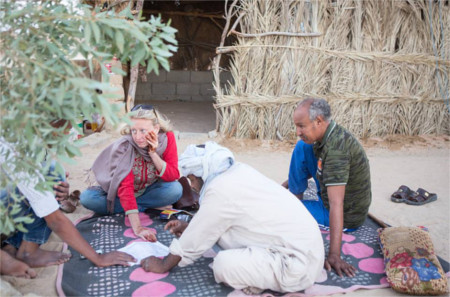Rebecca Murray is a freelance print journalist with work published for Vice News, McClatchy, Al Jazeera English, Middle East Eye, IRIN, The Christian Science Monitor and Inter Press Service. She has focused on reporting on Libya since the 2011 revolution, and traveled the country extensively. Murray was a contributor the book The Libyan Revolution and its Aftermath, which was published in 2016. She has also served as communications advisor and field researcher with humanitarian organizations, and trained local journalists in countries at war or in recovery, including Afghanistan, east Sri Lanka and Liberia. Murray is currently in Tunisia.
Hometown: Grew up in Kenya, the UK and the US.
Education: MA in International Affairs from the New School University in New York and from the places I’ve lived as a reporter.
Languages you speak: English and a little Arabic.
First job in journalism:
Living in south Lebanon and documenting the reconstruction of towns and clearance of thousands of cluster bombs from fields from the 2006 Lebanon-Israel war..
Countries reported from: I have lived and reported from Libya, Yemen, Afghanistan, Syria, Lebanon, Cambodia, Sri Lanka, Liberia, Ethiopia. I have also visited the Central African Republic, Iraq, and the Palestinian Territories.
When and why did you join the OPC:
I joined one year ago for the chance to belong to an institution with colleagues who share similar experiences to my own.
What draws you most to reporting on areas of conflict and fragile environments?
I grew up during an optimistic time in post-colonial Kenya during the 1970s, and have always been interested in how states build themselves up after falling apart. Sadly, in over a decade since I’ve covered the Middle East, states have disintegrated, communities have been ripped apart, sectarianism has replaced cohabitation, dangers have grown considerably, and the space for working as a journalism has shrunk considerably.
Major challenge as a journalist:
The ability to draw on friendly contacts and navigate hostile environments, and as a freelancer, to find funding and media outlets to tell the unique stories we find.
Best journalism advice received:
As a freelance journalist, live in one place instead of parachuting in, and get to know it and the characters in it well. This way, you will be able tell unique stories with trusted colleagues, understand the complexities of life there, and be able to afford doing this as a living. The downside? If officials don’t like your stories, you have nowhere to run.
Worst experience as a journalist: Living in places in constant fear of the government, armed groups, extremists, Internet surveillance, and for putting anyone else (hosts, fixers and those interviewed) in danger too.”
When traveling, I like to …
make sure I have my story logistics down, a good book and music for security of the mind, and a great place to go after the assignment is over.
Journalism heroes: Ghaith abdul-ahad, Rania Abouzaid, Emilio Manfredi, as well as photojournalists Tanya Habjouqa and Andrew Connelly.
Hardest story: The quieter stories, like repeatedly covering the absolute misery of refugees and migrants on their journeys – in the desert, in the sea, in detention centers, often accompanied with nothing but trauma – that has affected me the most.
Advice for journalists who want to work overseas: Find a location you have a passion for, that you’d like to learn about, and where it is safe to live. From this base, get to know the region’s culture, language and people well, and build up a large portfolio of unique stories.
Dream job: To get funding to shine a spotlight on the world’s changing environment: from apprehending bandit fishing ships to animal poachers, game hunters and traffickers – from Africa to the Middle East and South East Asia, to stopping corporations from destroying the world’s forests and wildlife.
Favorite quote: “The big problem in the world is that intelligent people are full of doubts while stupid people are full of certainties” – Charles Bukowski
Place you’re most eager to visit:
The world’s oceans by fishing vessel.
Most common mistake you’ve seen: Pack journalism, especially those who are assigned to countries they don’t know, endangering their fixers and community members in their wake. I’m reminded of the debris left behind on Mount Everest once the climbers have left.
Country you most want to return to: Can I pick two? Yemen and Syria.
Twitter handle: @beccamurr

